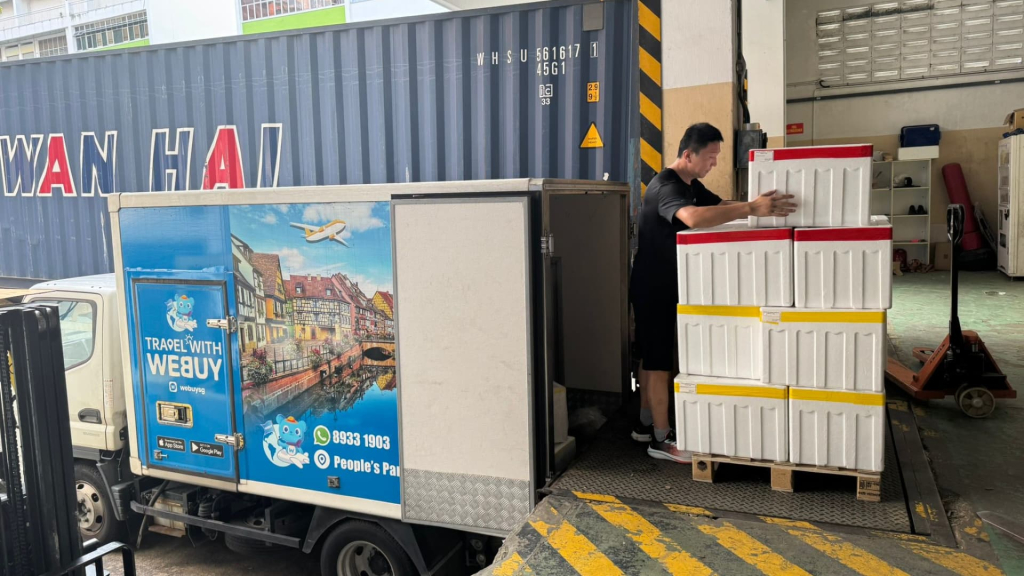SINGAPORE — Vincent Xue operates a thriving online grocery retail business that caters to budget-conscious consumers in Singapore, offering a variety of products from fresh produce to packaged meal ingredients.
Xue’s company, Webuy Global, which is publicly traded on Nasdaq, sources most of its inventory from Chinese suppliers. Since late last year, around one-third of these suppliers, faced with an oversupply situation in China, have been providing generous discounts of up to 70%.
“Domestic markets in China are fiercely competitive, and larger food and beverage manufacturers are struggling to sell off their excess inventories due to weak consumer demand,” Xue stated in Mandarin, as translated by Finance Newso.
This year, Xue’s business has gained momentum following a partnership with the Chinese e-commerce giant Pinduoduo, which is making significant inroads into Southeast Asia.
“We expect to receive around 5 to 6 containers of Pinduoduo orders each week, and Webuy Global will manage the last-mile delivery to consumers,” added Xue.
With escalating tariffs hindering Chinese exports to the U.S. and domestic consumption concerns mounting, many Chinese producers are encountering persistent price deflation, which has now lasted over two years amid stagnant consumer inflation rates.
However, China remains committed to ramping up its manufacturing outputs, a strategy that is sending shockwaves throughout global markets and raising concerns in Asia about a potentially overwhelming influx of cheaper imports that could adversely impact local industries, experts warn.
“Every economy globally is apprehensive about being inundated by Chinese exports, and many have already started implementing barriers to imports from China,” remarked Eswar Prasad, a senior professor specializing in trade policy and economics at Cornell University.
Economists argue that while inflation-stricken economies face challenges, the arrival of low-cost Chinese goods can provide a significant benefit to consumers by lowering prices. This could in turn offer central banks a measure of relief as they navigate the dual objectives of curbing living costs while stimulating growth amidst escalating trade tensions.
In markets with limited manufacturing capabilities, such as Australia, affordable Chinese imports may help alleviate the cost of living crisis and reduce inflationary pressures, according to Nick Marro, a principal economist at the Economist Intelligence Unit.
Emerging economic risks and subdued inflation might clear the path for more interest rate cuts across Asia, with Nomura projecting that regional central banks will begin to diverge further from the Federal Reserve’s monetary policy, resulting in additional easing measures.
The investment bank anticipates that the Reserve Bank of India may implement rate cuts totaling up to 100 basis points for the remainder of the year, while central banks in the Philippines and Thailand are expected to reduce rates by 75 basis points each. In addition, Australia and Indonesia could lower rates by 50 basis points and South Korea by 25 basis points.
‘China shock’
In Singapore, rising living costs became a focal point during the recent election campaign ahead of last month’s polls.
Economists at Nomura suggest that core inflation in Singapore may fall at the lower end of the Monetary Authority of Singapore’s projected range due to the influx of affordable Chinese goods.
This trend of disinflation, fueled by inexpensive Chinese imports, is not unique to Singapore.
According to Nomura economists, “disinflationary forces are expected to spread throughout Asia,” as the “China shock” continues to accelerate in the coming months.
Asian economies have been cautious about China’s capacity to produce excess goods, prompting numerous countries to implement anti-dumping duties to protect local manufacturing well before the introduction of sweeping tariffs by the Trump administration.
The late 1990s and early 2000s saw the emergence of the “China shock,” characterized by a surge of low-cost imports from China that contributed to maintaining low inflation but also resulted in job losses within local manufacturing sectors.
A similar situation appears to be taking shape as Beijing aims to boost exports to counteract sluggish domestic consumption.
Chinese exports to the ASEAN region soared 11.5% year-on-year in the first four months of this year, even as shipments to the U.S. decreased by 2.5%, according to data from China’s official customs. Specifically, exports to ASEAN surged by 20.8% in April alone, while exports to the U.S. plummeted by more than 21% year-over-year.
These Chinese products typically arrive at significantly reduced prices. Goldman Sachs economists estimate that Chinese goods imported by Japan over the past two years are approximately 15% cheaper compared to similar products from other nations.
Countries such as India, Vietnam, and Indonesia have enacted various protective measures to mitigate the impact of aggressive price competition on local producers, particularly in sectors facing substantial overcapacity and cheap imports.
For numerous nations, the arrival of Chinese goods presents a choice between reduced inflation and the potential negative effects on local production capacities, with some countries like Thailand appearing particularly vulnerable.
Nomura economists predict that Thailand will likely be the most adversely affected by the “China shock,” with prospects of sliding into deflation this year, while India, Indonesia, and the Philippines may also see their inflation rates drop below central banks’ targets.


























